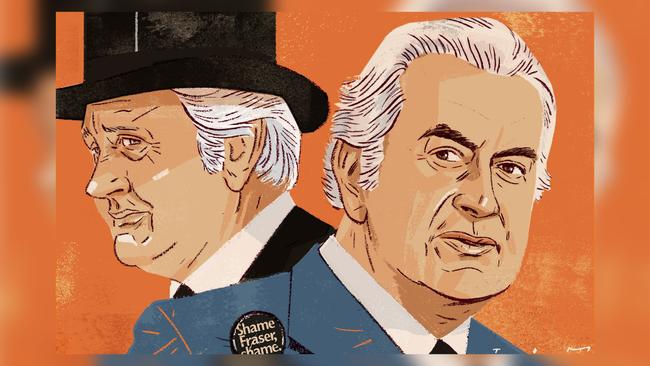
I was born six weeks after Whitlam’s dismissal. It has become a magnificent obsession. No political event has captured or sustained my interest like the dismissal. The personalities, the issues at stake and the turn of events is like nothing else. It was a monumental train wreck for our political institutions. Understanding it is essential to ensure that it never happens again.
It was a dismissal by ambush of the prime minister by the Queen’s representative in Australia. The governor-general acted in the Queen’s name but she would not have done what he did. The testimony from those at Buckingham Palace along with new documentary evidence confirms this beyond doubt.
In 1975, Australia’s political institutions were put under strain as precedents were shattered and conventions were smashed in the pursuit of power by the Coalition led by Malcolm Fraser and Doug Anthony. The blocking of the budget in the Senate to force an election was unprecedented. It was a contest that pitted two giants from a different age — Whitlam and Fraser — against one another. But there are no heroes.
Whitlam ultimately lost but won the adoration of the Labor faithful. Yet his mistakes and missed opportunities, and his immense self-belief that he would prevail in a grand contest to safeguard democracy, are extraordinary in hindsight. Whitlam never had a viable solution to the crisis — it was mostly “crash or crash through” — and he treated Kerr with condescension.
Fraser pushed the political system to the brink. He cloaked his ambitions in high morality — arguing it was necessary to terminate the government — but he paid a price for his ruthlessness. Andrew Peacock and John Howard told me that the dismissal made Fraser overly cautious in government, aware of the divisions he had unleashed.
Kerr — clever, calculating and cunning — was in the middle. He wanted to make his mark on history. He once dreamt of becoming prime minister. He was fascinated by the reserve powers. He saw himself as a constitutional referee rather than its guardian. He failed the ultimate test established by English writer Walter Bagehot about the crown — the right to consult, encourage and warn ministers, and avoid confrontation.
Kerr lived the rest of his life in fear of hostile demonstrations and obsessed about the events of 1975. He spent years in exile in the UK. He hoped to explore “fresh fields” after 1975 — a new career — but this was never possible. He would ask almost everybody he met: “Do you think I did the right thing?” He became a sad and lonely figure.
While the Coalition won the 1975 election, most voters never supported blocking supply or the dismissal. To conflate the election result as justification for the dismissal is to misunderstand the crisis and misinterpret the public mood. The Whitlam government was almost always going to lose the next election.
My interest in the dismissal was sparked by Kerr’s death in 1991. I wrote a high school project on the dismissal. I scrolled through newspaper reports on microfiche at my local library. I watched old TV news reports, the anniversary specials and The Dismissal miniseries. I have spent many weeks in archives discovering new documents that illuminate the crisis.
I read every book on the dismissal and wrote to Paul Kelly when he was editor-in-chief of this newspaper about his first book on the subject. It is thrilling to have written two books with Kelly — the pre-eminent historian of the dismissal — and dozens of articles together over the past decade.
I have made it my mission to talk to former ministers, opposition MPs, Labor and Liberal staffers, public servants, party officials and journalists about the dismissal. It has been fascinating to talk to Kerr’s official secretary, Sir David Smith, and the Queen’s then assistant private secretary, Sir William Heseltine. I interviewed Jimmy Carter about any CIA links and Harold Wilson’s staff in No 10 for their reaction.
Whitlam was contemptuous towards Kerr and viewed his dismissal as a “a coup”. He believed chief justice Garfield Barwick’s advice was “nonsense”. He thought he gave better speeches than the one he gave on the steps of Parliament House that day. He later apologised to the Queen for recommending she appoint Kerr as governor-general. He wanted to be remembered as an “achiever” not a “martyr”.
Fraser told me the dismissal was “exhausted” as a subject but nevertheless answered my queries. He told me Kerr “was frightened of being dismissed” by Whitlam. He said Kerr was “not a strong personality”, always “seeking reassurance” and “concerned about his place in history”. Fraser exploited Kerr’s character defects for political advantage. Fraser had no regrets about his actions.
The events of 1975 still matter because this was an unsatisfactory solution to the crisis and it undermined our democracy. Kerr’s intervention split the nation, poisoned our politics and compromised institutions.
The release of correspondence between Kerr and Buckingham Palace renewed public curiosity about the dismissal. Paul Keating and Bill Hayden — ministers in 1975 — see no evidence implicating the Queen in the dismissal. Keating describes this as “tilting at shadows”.
Interest in the dismissal transcends generations — I am testament to that. But it is each generation’s responsibility to tell this story accurately, with evidence, and to interpret it correctly. This is especially important in a post-truth age where conspiracies excite the imagination and often matter more than logic, reason and facts.
Troy Bramston is co-author with Paul Kelly of The Truth of the Palace Letters: Deceit, Ambush and Dismissal in 1975 (MUP).




The dismissal of Gough Whitlam’s government by Sir John Kerr on November 11, 1975, remains the most dramatic, divisive and convulsive event in our political history. Now 45 years on, it never ceases to surprise or astonish from one generation to the next, with new interviews and archival discoveries, and assessments and interpretations.